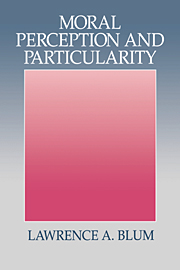Book contents
9 - Moral development and conceptions of morality
Published online by Cambridge University Press: 12 January 2010
Summary
Contemporary moral philosophy has been little concerned with developmental questions. The academic division of labor has consigned such matters to psychologists, who, in turn, have generally seen little need to address normative and philosophical issues. This separation has taken its toll on both disciplines. A responsible and comprehensive understanding of morality requires both disciplines and the few signs of cooperation and crossover are to be warmly welcomed.
By and large, contemporary moral philosophy has not felt pressed to explore what it is like to be a person who lives according to its various normative theories, nor how one gets to be such a person. This neglect of the psychic substratum of morality can be given a philosophical rationale – that philosophy's role is simply to demonstrate the rational soundness of views of morality. On this view philosophical acceptability need have no connection to psychological reality. A further assumption in this direction – made, for example (though not consistently adhered to), by Kant–is that rational acceptability is by itself sufficient to motivate conformity to morality. This view at least has the virtue of recognizing the psychic underpinnings of morality as an issue, but it gives an entirely false picture of those psychic underpinnings. Happily, influential contemporary neo-Kantians such as Marcia Baron, Barbara Herman, Thomas Hill, Jr., Adrian Piper, and Stephen Darwall have shown a much greater interest in moral psychology, though less in moral development.
- Type
- Chapter
- Information
- Moral Perception and Particularity , pp. 183 - 214Publisher: Cambridge University PressPrint publication year: 1994
- 1
- Cited by



